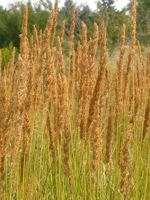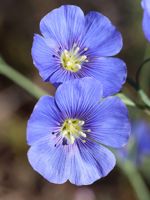Mon-Fri 9am - 5pm Mountain time
Slimstem Reedgrass vs Blue Flax
Calamagrostis stricta
Linum lewisii
CUSTOM GROW
NOT AVAILABLE THIS SEASON - MIGHT RETURN
Slimstem Reedgrass is a native perennial bunchgrass commonly found in damp meadows, wetlands, and along streams and lakeshores. It thrives in wet, nutrient-poor soils and shows some tolerance to saline conditions. Typically a bunchgrass, it can also spread by rhizomes to form colonies, making it well-suited for soil stabilization, riparian zone planting, and wetland restoration projects.
Slimstem Reedgrass provides valuable cover for small animals and birds, and its dense growth can even serve as nesting habitat for waterfowl in wetland areas. Its seeds offer forage for wildlife, while the tall stems and floral spikes add texture and visual interest to the landscape.
Blue Flax is a native perennial wildflower known for its blue to violet flowers. Each flower lasts just a single day, but new blooms appear continuously, providing weeks of colour. This extended flowering period provides a reliable display from late spring into summer and attracts a variety of pollinators.
They can self-seed readily, so removing spent blooms helps manage their spread. Birds feed on the seeds, and when cooked, they are edible and are described as having a mild, nutty flavour. The plant grows in loose clumps with slender stems and fine foliage. Young plants are leafy, but as they mature, most leaves are shed.
Blue Flax grows well in a wide range of soils, including poor or sandy conditions, and is drought-tolerant once established. The deep root system helps to stabilize soil and prevent erosion. They are well-suited for pollinator gardens, restoration, naturalization, and xeriscaping projects.
Slimstem Reedgrass Quick Facts
Blue Flax Quick Facts
Toxicity: toxic to some animals, raw seed toxic

